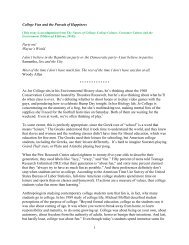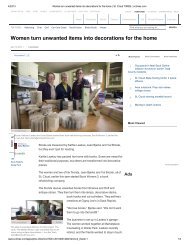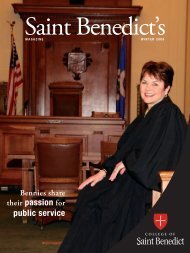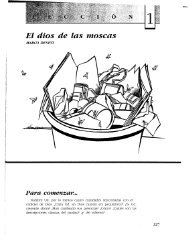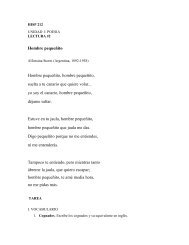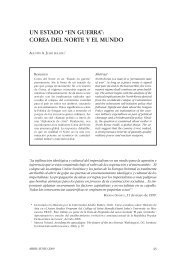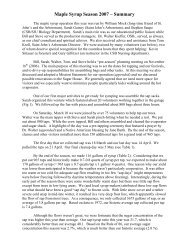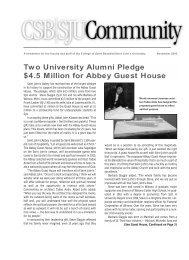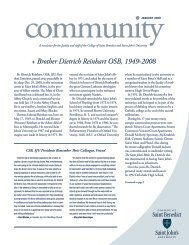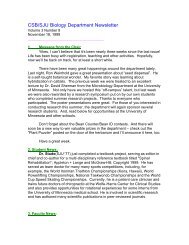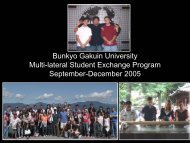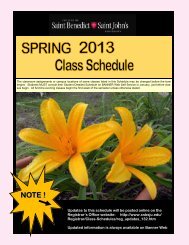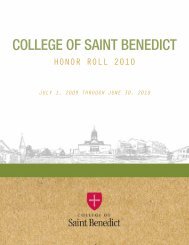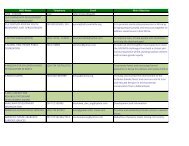First and Focused - College of Saint Benedict & Saint John's University
First and Focused - College of Saint Benedict & Saint John's University
First and Focused - College of Saint Benedict & Saint John's University
You also want an ePaper? Increase the reach of your titles
YUMPU automatically turns print PDFs into web optimized ePapers that Google loves.
<strong>Saint</strong> John’s asks you not to stay in your<br />
little shell or your little bubble. What it<br />
pushes instead is that to be a man is to be<br />
open, to strive, to do good, to be respectful<br />
to yourself <strong>and</strong> others.<br />
his nerves by playing piano at his church<br />
in suburban Portl<strong>and</strong> <strong>and</strong> singing in the<br />
choir. “I’ve had a good life,” he said. “How<br />
many people really get to say that? And I<br />
tell you why it was so good, why I was able<br />
to make it through, it’s because I realized<br />
early on—<strong>Saint</strong> John’s made me realize—that<br />
learning how to think is more<br />
important than learning how to get a job,<br />
because the job market changes. Being a<br />
thinker doesn’t change.”<br />
That reality bears out for tailored graduate-school<br />
education, too. “Medical schools<br />
<strong>and</strong> business schools <strong>and</strong> law schools are<br />
actually actively looking for people who<br />
don’t necessarily come from traditiona l<br />
backgrounds. Liberal-arts colleges do well<br />
there,” says Jaschik. “Generally, colleges do<br />
Getting out <strong>of</strong> “The Bubble”<br />
International education <strong>and</strong> experiential learning<br />
are distinguishing characteristics at <strong>Saint</strong> <strong>John's</strong>.<br />
Here’s what SJU seniors report:<br />
64% participated in community service or volunteer work.<br />
63% augmented their classroom studies with a<br />
practicum, internship or clinical experience.<br />
42% participated in credit-bearing international study<br />
programs in 2008-09. (SJU <strong>and</strong> CSB rank in the top<br />
three colleges nationally for study-abroad participation.)<br />
37% did a semester-long research project.<br />
r<strong>and</strong> gallagher ’08<br />
best when they’re pursuing a specific identity<br />
<strong>and</strong> sticking to it. <strong>Saint</strong> John’s is smart<br />
for doing that.”<br />
Alex Siebenaler ’02 agrees, but adds a<br />
sobering sense <strong>of</strong> the mental <strong>and</strong> emotional<br />
<strong>and</strong> spiritual development <strong>of</strong> 18-year-old<br />
men. “There are very few compassionate<br />
18-year-olds,” he says. “And I had my fun.<br />
But when I left <strong>and</strong> took a step back, I<br />
realized I had learned how to be who I am<br />
now.”<br />
Currently working as a project manager<br />
at the business firm Thompson-Reuters in<br />
Eagan, the former English major adds that<br />
he learned a lot about his education after<br />
his formal education was over. He realized<br />
how much leadership he learned outside<br />
<strong>of</strong> his expected routine—when he started a<br />
kickball league, or when he worked in the<br />
cafeteria, or when he was put in charge <strong>of</strong><br />
a creative writing class when his pr<strong>of</strong>essor<br />
was out for a month because his wife was<br />
very sick.<br />
“Choosing a career is not the<br />
same as choosing a major. A<br />
major is something specific<br />
that helps you get in touch<br />
with the bigger picture <strong>of</strong><br />
who you are. A major is<br />
something where it helps<br />
to approach it as a blank<br />
slate, ready to learn.<br />
“But a career is something<br />
that you won’t do<br />
well at unless you come<br />
into it as a full person,”<br />
Siebenaler says, adding:<br />
“My job isn’t a specific skill.<br />
No big job is. I have to know<br />
all the computer science <strong>of</strong> my<br />
company’s system <strong>and</strong> programs.<br />
I need to underst<strong>and</strong> finance to keep<br />
18<br />
things under budget. I need to be literate<br />
in legalese. I couldn’t do that unless I<br />
believed I could do anything. And I believe<br />
that because I went to <strong>Saint</strong> John’s.”<br />
Sometimes he sees friends he describes<br />
as being “stuck in their major” <strong>and</strong> how<br />
frustrated they are. “You don’t want to be<br />
living a life at 30 or 40 that you set out for<br />
yourself when you were 18 or 20,” he says.<br />
“If we thought that was a good idea, we<br />
would all have stuck with being a cowboy<br />
or astronaut or basketball player, or whatever<br />
we wanted to be when we were 10.”<br />
Talking with Johnnie alumni, the<br />
phrases you hear again <strong>and</strong> again are things<br />
like “community,” “family,” “trust,” “sense<br />
<strong>of</strong> self,” “sense <strong>of</strong> place.” For Siebenaler,<br />
that realization came during a three-day<br />
alumni pheasant hunt he helped organize<br />
in South Dakota last October. “I knew<br />
one out <strong>of</strong> 15 people who were there, <strong>and</strong><br />
that was just my dad,” he says. We all had<br />
12-gauge shotguns, <strong>and</strong> we were all strangers,<br />
but there was just a trust, a comfort<br />
that this was family. I’m friends now with<br />
all <strong>of</strong> them. We’re brothers. And we got<br />
130 pheasants.”<br />
Matt Stergios '78 went to <strong>Saint</strong> <strong>John's</strong><br />
sight unseen <strong>and</strong> was scared when he<br />
graduated. "At the time, I wasn't even<br />
aware <strong>of</strong> how broad-based my education<br />
was", he says. “My friends who were business<br />
majors were being recruited at salaries<br />
that I couldn't dream <strong>of</strong>, <strong>and</strong> I felt like I<br />
was missing out."<br />
But he took a job in teaching, his lifelong<br />
passion, in Montana. "Now I feel the<br />
opposite," he says, “ because I have more<br />
control, more flexibility, more happiness<br />
<strong>and</strong> purpose. When I talk to those same<br />
friends now, I get the feeling that their<br />
careers didn't satisfy them as mine does<br />
me. People tell me that I am lucky. I have a<br />
job that gets me excited when I get out <strong>of</strong><br />
bed in the morning. I've had other jobs—I<br />
shoveled gravel, I mopped floors. I knew<br />
what it was like to do a job for the money,<br />
a job that didn't challenge me or enable<br />
me to grow as a person. I didn't want that<br />
for my life. And I don't think <strong>Saint</strong> <strong>John's</strong><br />
wanted that for me either."<br />
Part <strong>of</strong> that comes from the role <strong>of</strong><br />
<strong>Benedict</strong>ine values on campus. “We’ve got<br />
something good going for us,” says Katie<br />
Johnson, CSB/SJU associate pr<strong>of</strong>essor <strong>of</strong><br />
communication, “a purposefulness <strong>and</strong> a<br />
great perspective on gender <strong>and</strong> identity.<br />
There’s an overt discussion <strong>of</strong> living your



